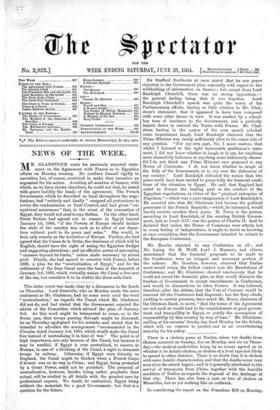Sir Stafford Northcote at once stated that he saw grave
objection to the Government plan, especially with regard to the withholding of information on finance ; but, except from Lord Randolph Churchill, there was no strong opposition,—
the general feeling being that it was hopeless. Lord Randolph Churchill's speech was quite the worst of his Parliamentary efforts, having so little relation to Mr. Glad- stone's statement, that it appeared to have been composed with some other theme in view. It was marked by a school- boy tone of insolence to the Government, and a perfectly impish desire to embroil the Tories with France. Mr. Glad- stone having in the coarse of his own speech rebuked some impertinent laugh, Lord Randolph observed that the Prime Minister was rarely sufficiently alive to the comic side of any question. "For my own part, Sir. I must confess, that whilst I listened to the right honourable gentleman's state- ment, I did not know whether to laugh or to cry, for anything more shamefully ludicrous or anything more ludicrously shame- ful I do not think any Prime Minister ever proposed to any House of Commons. I do not know whether to laugh at the folly of the Government, or to cry over the dishonour of my country." Lord Randolph ridiculed the notion that two years could have been needed to grasp fully the financial condi- tions of the situation in Egypt. He said that England had. ceded to France the leading part in the conduct of the Egyptian negotiations, in virtue of the "piratical enterprise of Napoleon,"—which was a pure imagination of Lord Randolph's. He asserted also that Mr. Gladstone had become the political pensioner of the French Republic,—which, he intimated, would hardly survive another three years. M. Ferry is the patron, according to Lord Randolph, of the existing British Govern- ment, just as Louis XIV. was the patron of Charles II. And he declared that unless the House of Commons were utterly lost to every feeling of independence, it ought to insist on knowing at once everything that the Government intended to submit to the European Conference.


































